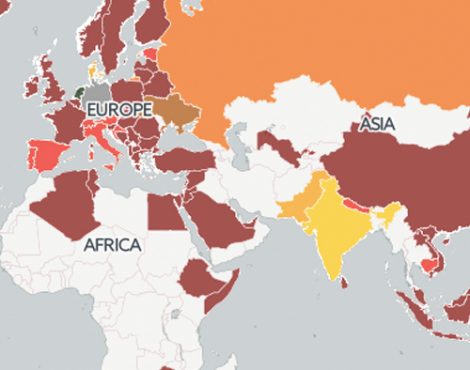Decriminalisation. Regulation. Legalisation. These are the words that are currently resonating the sentiments of many patients who have given up on prescription drugs and are now relying on medical cannabis. Patients across the world, suffering from a wide range of diseases and medical conditions are now turning to this plant, as what they believe is life altering and in some cases, life saving.
Countries like Spain and Israel have decriminalised cannabis and are now conducting research on the plant by isolating its compounds and to understand their effects on the human body. 23 States and the District of Columbia in the U.S. have legalised the drug for medicinal use, though at the federal level it still remains illegal. In countries like Jamaica, Peru and Columbia possession of up to a certain quantity for personal use is tolerated. The quantity of possession differs depending on the country’s laws. (The map below shows the legality status of cannabis across the world based on possession. Click Here to view more maps).
Other U.S. States are now following suit and recognising the need for medical patients to access the plant to treat not just chronic pains and spasms, but also make it accessible to cancer patients. Recent media reports highlighted that The National Cancer Institute of the US Department of Health admitted that cannabis can kill cancer cells.
Even though it is debatable whether or not children should be given the drug, a breakthrough has been achieved in the U.S. state of Colorado in that regard. Charlotte Figi became a well-known case from the state. She suffers from Dravet’s Syndrome that brings on seizures multiple times a day. 8-year old Charlotte (then 5-Years old) was seizing 300 times a week. Her parents finally decided to get a cannabis prescription from their doctors and started giving her drops of cannabis oil in her food. Charlotte was recovering unexpectedly.
The Stanley Brothers from Denver, Colorado now grow a strain called Charlotte’s Web, which is given to many children in the state with similar conditions. CNN covered Charlotte’s story in a documentary called Weed, which tries to explore the benefits and the harms associated with cannabis.
Whether or not the drug should be given to children remains highly debatable, especially due to the effects it can have owing to prolonged use. Closer to home, here in the UK, campaigners are fighting to legalise medical cannabis for many patients who have resorted to the drug as an alternate form of medicine.
The United Patients Alliance is one such group formed of patients, by patients and for patients. Jonathan Liebling, Political Director of the UPA advocates medicinal use, even for children. He strongly feels:
“We may choose some age at which we decide as a society we don’t want people recreationally using drugs. Medical Cannabis would be treated separately. If your doctor prescribes it, then it’s fine. it’s for you and can prescribe it for children because there are some strains of Cannabis that are specifically grown for children who suffer from epilepsy and cancer.”
Many argue that while other countries across the world are considering decriminalisation and legalising the drug for medicinal use, the UK is still far behind. People have now urged MPs to debate cannabis legalisation in Parliament on October 12, 2015, which will be led by left-wing Labour MP Paul Flynn. This comes after a UK petition started by James Richard Owen, an economics student at Aberystwyth University, received over 200,000 signatures at the time of writing.
The petition which, urged the government to “make the production, sale and use of cannabis legal” received a damning response from the government. Part of the response read:
“Cannabis can unquestionably cause harm to individuals and society. Legalisation of cannabis would not eliminate the crime committed by the illicit trade, nor would it address the harms associated with drug dependence and the misery that this can cause to families.”
A more recent petition doing the rounds comes from Jacob Lawrence Barrow. It “demands the British Government to Reschedule Cannabis” and decriminalise the drug for medicinal use. At 10,000 signatures, petitions will receive an official response from the government. Those that receive over 100,000 signatures are liable to be debated in Parliament. This one currently stands at over 3,200 signatures..


